A man from the tiny Central Pacific nation of Kiribati has failed in his attempt to be classed as the world’s first “climate refugee”.
Ioane Teitiota, 38, tried to persuade New Zealand’ Supreme Court that his homeland had become unsafe due to rising sea levels, but the court ruled he was not at risk from serious harm or persecution, adding that his nation was taking steps to protect its citizens.
As the decision was taken by the highest court in New Zealand, Mr Teitiota now has no other way to appeal his case and now faces deportation.
The Telegraph reports that Teitiota came to New Zealand with his wife in 2007 but overstayed his visa. He was caught in 2011 after being arrested for a traffic offence.
His claim to be a “climate refugee” was based on the idea rising sea levels had destroyed his crops and contaminated his water supply.
But the court ruled: “While Kiribati undoubtedly faces challenges, Mr. Teitiota does not, if returned face ‘serious harm’.”
“There is no evidence that the government of Kiribati is failing to take steps to protect its citizens from the effects of environmental degradation, to the extent that it can.”
Despite its ruling, the court added that this did not mean “environmental degradation resulting from climate change or other natural disasters could never create a pathway into the Refugee Convention or protected person jurisdiction”.
Formerly known as the Gilbert Islands, Kiribati consists of 33 small Pacific islands dispersed over 1.4 million square miles of ocean. It is one the world’s lowest lying nations, leading to fears it will be swamped by rising sea levels in climate change doomsayers are proved right.
However, a study last year found that sea levels have not risen by as much as previously predicted. Oceanographer William P de Lange and marine geologist Bob Carter said there was little evidence to support claims, such as those by Al Gore, that the sea would rise by 20 feet by the end of the century.
“No justification exists for continuing to base sea-level policy and coastal management regulation upon the outcomes of deterministic or semi-empirical sea-level modelling, they wrote.
“Such modelling remains speculative rather than predictive. The practice of using a global rate of sea-level change to manage specific coastal locations worldwide is irrational and should be abandoned.”

COMMENTS
Please let us know if you're having issues with commenting.